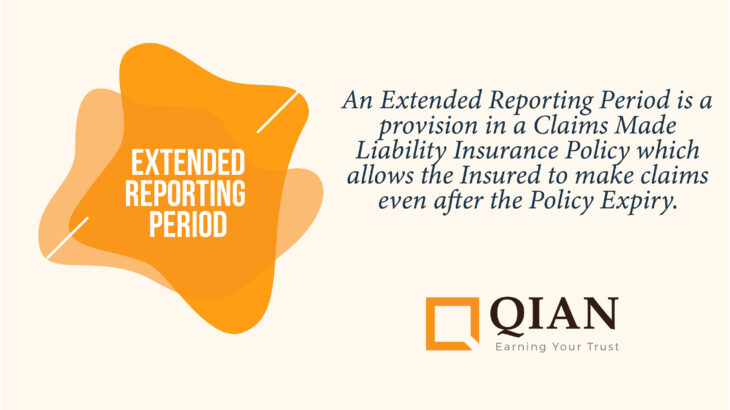What is an Extended Reporting Period?
An Extended Reporting Period in Insurance, also known as ERP, a provision in a Claims Made Liability Insurance Policy which allows the Insured to make claims even after the Policy Expiry.
A Claims Made Insurance Policy is a type of Policy which requires the triggering claim event to occur and reported within the Policy Period. If Claims are reported after the Policy Expiry, then a Claims Made Policy will not provide Insurance Coverage for the Claim Event.
However, an Extended Reporting Period Endorsement allows the Insured to report his Insurance Claim even after the Policy Expiration.
An Extended Reporting Period does not apply to Occurrence Based Policy as the Occurrence Policy provides coverage as long as the Claim Triggering Event took place within the Policy Period.
Which type of Insurance Policies offer Extended Reporting Period?
Most liability insurance policies listed below offer Extended Reporting Period:
- Commercial General Liability Insurance
- Cyber Liability Insurance Policy
- Directors and Officers Liability Insurance Policy
- Commercial Crime Insurance Policy
Most liability insurance policies offer automatic Extended Reporting Period of 60 days and if you need a longer Extended Reporting Period, the Insured can purchase one by paying an additional Premium.
How does Extended Reporting Period (ERP) Work?
The working of ERP can be explained with the help of an example:
Consider a Claims Made D&O Liability Insurance Policy which expired on 1st Jan 2021 and was not renewed. The Policy had an extended reporting period of 90 Days. A Claim event occurred on 15 December 2020 and the Insured was informed of the same on 15 Jan 2021.
The Policyholder could avail a claim from his D&O Insurance Policy since his Policy had an Extended Reporting Period of 90 Days. In the absence of the Extended Reporting Period, the Policyholder would not have been able to make a Claim under the Policy.
What are the reasons for including Extended Reporting Period under a Liability Insurance Policy?
Claims Made Policies should include an Extended Reporting Period for the following reasons:
Non-Renewal of Policy: There may be times when the Insured does not renew his Claims Made Liability Insurance Policy, such as when the business is shutting down. The Insured, in such cases, still remains exposed to claims for his past actions even though the business has shut down. In such cases, an Extended Reporting Period Coverage will enable the Insured to make a claim for any of his past actions.
Switching to Occurrence Based Policy: In some cases, an Insured might be making a switch to Occurrence Based Policy from a Claims Made Policy. Occurrence Based Policies do not have the provision of Retroactive Date. As a result, no coverage for claims under the previous Claims Made Policy would be available under the new Occurrence Based Policy. In such circumstances, the Insured should avail an Extended Reporting Period to continue coverage for claims arising under the previous Claims Made Policy.
Conclusion
An Extended Reporting Period offers peace of mind by providing Insurance Coverage for claims that arise even after Policy Expiry. The cost of an Extended Reporting Period Endorsement is also reasonable and one can avail Extended Reporting Period of upto 6 month to 1 year by paying reasonable Premiums.
An Insured should always take Extended Reporting Period Coverage in a Claims Made Policy. It is advisable to consult your Insurance Broker regarding your liability Insurance Coverages.
Qian is a licensed Insurance Broker and we can assist you with comprehensive coverages and competitive quotes for your Insurance Policies. If you have any queries regarding Insurance, you can email us at inurance@qian.co.in or call us on 022-22044989

